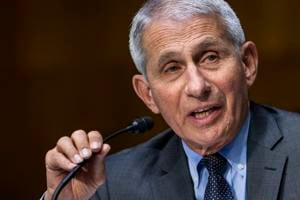
WASHINGTON — When a South Carolina congresswoman began investigating a monkey farm three years ago, Dr. Anthony Fauci wrote her a letter revealing details of secretive government experiments using primates from Morgan Island, better known as Monkey Island.
In language that that reads at times like science fiction, Fauci confirmed to U.S. Rep. Nancy Mace that 382 of the island’s monkeys had been used in experiments funded by the National Institute for Allergy and Infectious Diseases over two years. The experiments, he said, were part of $658 million spent agency-wide in research using monkeys as subjects.
Mace has been a critic of Morgan Island and has called its treatment of monkeys cruel and inhumane.
The letter from Fauci, the then-head of the National Institutes of Health, offered the first glimpse inside a taxpayer-funded breeding farm on a barrier island that has been largely sealed off from the public for more than four decades. It gave details of what happens each year to about 500 Morgan Island monkeys who are herded into enclosures on the island and shipped to federal holding centers in rural Maryland before they are sent to labs across the country.
Monkeys, Fauci said, allow NIH to “study systems and processes that would otherwise not be possible to investigate. It is important to note that NIH takes the welfare of animals used in research seriously.”
Much of Fauci’s defense of primate testing has been turned on its head by the Trump administration, where three of the nation’s leading health agencies — the NIH, the Veterans Administration, and the Food and Drug Administration — are phasing out most primate testing.
NIH has not reduced funding for Morgan Island, which recently received another $4.1 million for operating costs. Scientists have said they need the reserve of federally-owned rhesus monkeys in case the nation has to speedily develop new vaccines and medications, as they did during the COVID pandemic or in response to a terror attack.
The island’s most recent population count is 3,742 monkeys, each costing as much as $25,000 in today’s market. It is the largest free-ranging colony in the nation.
Mace recently said she supports shutting down Morgan Island but hopes the animals, who have lived on the island since 1979, are not “slaughtered” if it is phased out. She supports transforming the island into a monkey sanctuary.
Fauci assured Mace that at NIH all monkey experiments go through a “rigorous scientific review” that includes approval from an Institutional Animal Care and Use Committee, required by law at every federal lab. At Morgan Island, NIAID has a seven-member committee of veterinarians, scientists and at least one local community representative to advise the agency on animal treatment.
The Trump administration has begun to lift the secrecy around committees overseeing research labs that handle biohazards, but the names of Morgan Island’s committee members are still closely held. The chairman, Bernard Flynn, is a Maryland veterinarian who worked for Charles River Laboratories when that company ran Morgan Island.
Flynn said the committee meets twice a year, sometimes at the property, but does not review research proposals since no experiments are done on the island. The committee’s job, he said, is to ensure the monkeys are well cared for by the current contractor Alpha Genesis, which also has members on the committee. He said the island’s monkey caretakers are dedicated to the animals and call many of the primates by name.
“There’s not any heady, super scientific secret stuff going on. They’re just monkeys making babies,” Flynn said.
According to Fauci, many Morgan Island monkeys were shipped in 2020 and 2021 to Rocky Mountain Laboratory, a high-security federal lab in a small Montana town that is a leading research center for infectious diseases. Scientists injected the monkeys with COVID-19, HIV, tuberculosis and other deadly viruses, then euthanized them at the end of studies.
In Bethesda, Md., sixty-eight Morgan Island primates were used to study whether vaccines can prevent the spread of malaria from pregnant women to their fetuses. The NIH lab kept 121 monkeys on hand for various projects.
Fauci ranked one experiment conducted at a U.S. Army lab in Frederick, Md., as “Category Five,” the highest pain level allowed. Monkeys were forced to inhale lethal Ebola virus in a high security lab where researchers wear positive-pressure suits to avoid exposure. The project used 41 Morgan Island monkeys.
Mace in 2021 made a boat trip to Morgan Island with an animal rights group to call media attention to the colony. She followed up the trip with questions to Fauci. When Fauci responded in February, 2022, the animal rights group White Coat Waste posted his letter on its website, but it received little public attention, said Justin Goodman, the group’s senior vice president.
Goodman said Fauci’s letter exposed how “taxpayer-funded Monkey Island is the NIH’s primary pipeline to its most painful primate experiments across the country, accounting for half of all of the monkeys confined by the NIH.”
Fauci is now under fire from the political right for his handling of the COVID crisis and federal funding for experiments altering the genetic composition of viruses. Fauci, who is retired, did not respond to a message from The Post and Courier.
(Except for the headline, this story has not been edited by PostX News and is published from a syndicated feed.)

